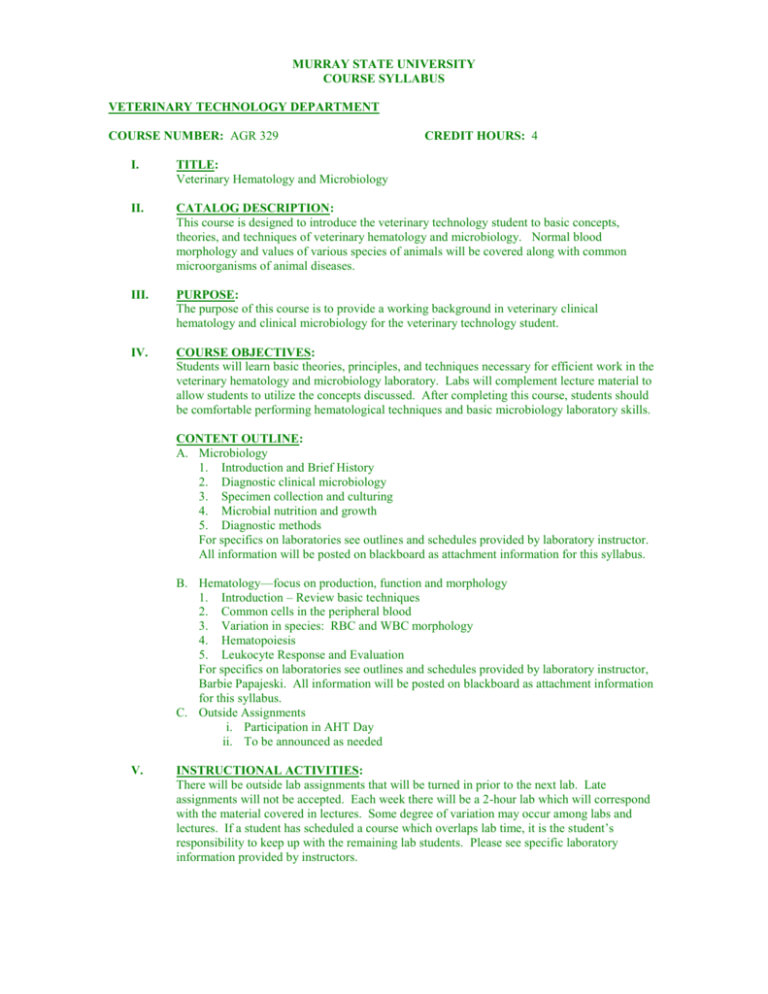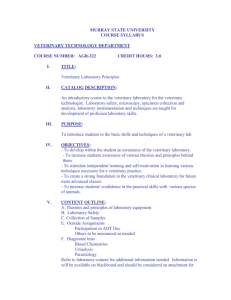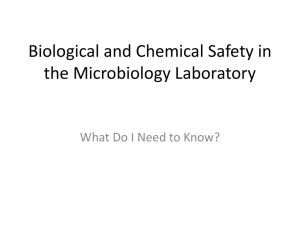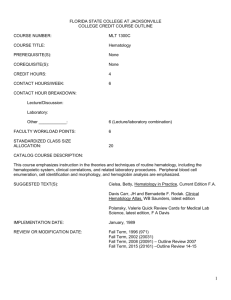MURRAY STATE UNIVERSITY
advertisement

MURRAY STATE UNIVERSITY COURSE SYLLABUS VETERINARY TECHNOLOGY DEPARTMENT COURSE NUMBER: AGR 329 CREDIT HOURS: 4 I. TITLE: Veterinary Hematology and Microbiology II. CATALOG DESCRIPTION: This course is designed to introduce the veterinary technology student to basic concepts, theories, and techniques of veterinary hematology and microbiology. Normal blood morphology and values of various species of animals will be covered along with common microorganisms of animal diseases. III. PURPOSE: The purpose of this course is to provide a working background in veterinary clinical hematology and clinical microbiology for the veterinary technology student. IV. COURSE OBJECTIVES: Students will learn basic theories, principles, and techniques necessary for efficient work in the veterinary hematology and microbiology laboratory. Labs will complement lecture material to allow students to utilize the concepts discussed. After completing this course, students should be comfortable performing hematological techniques and basic microbiology laboratory skills. CONTENT OUTLINE: A. Microbiology 1. Introduction and Brief History 2. Diagnostic clinical microbiology 3. Specimen collection and culturing 4. Microbial nutrition and growth 5. Diagnostic methods For specifics on laboratories see outlines and schedules provided by laboratory instructor. All information will be posted on blackboard as attachment information for this syllabus. B. Hematology—focus on production, function and morphology 1. Introduction – Review basic techniques 2. Common cells in the peripheral blood 3. Variation in species: RBC and WBC morphology 4. Hematopoiesis 5. Leukocyte Response and Evaluation For specifics on laboratories see outlines and schedules provided by laboratory instructor, Barbie Papajeski. All information will be posted on blackboard as attachment information for this syllabus. C. Outside Assignments i. Participation in AHT Day ii. To be announced as needed V. INSTRUCTIONAL ACTIVITIES: There will be outside lab assignments that will be turned in prior to the next lab. Late assignments will not be accepted. Each week there will be a 2-hour lab which will correspond with the material covered in lectures. Some degree of variation may occur among labs and lectures. If a student has scheduled a course which overlaps lab time, it is the student’s responsibility to keep up with the remaining lab students. Please see specific laboratory information provided by instructors. VI. FIELD AND CLINICAL EXPERIENCES: Laboratories: Microbiology Safety Sample collection techniques Macroscopic exam of colony growth (gross morphology) Streaking techniques Staining procedures Microscopic morphology Isolation of pure culture Hematology Blood smears and staining techniques RBC morphology of various species; PCV & TPP Differentials, absolute WBC counts and WBC counts Platelet estimation CBC Outside class assignment Participation in AHT Day Laboratory requirements: 1. Students are required to wear ceil blue scrubs and white lab coats in the lab. No scrubs, no lab coat, no lab, no grade. This will be counted as an absence. 2. Following lab exercises, it is the student’s responsibility to see that all supplies are put away and the work areas are thoroughly cleaned. Failure to do so will result in point deduction from lab exercise for every one in that lab. 3. It is the responsibility of student who arrives late or has scheduled classes which conflict, to catch up on activities of the lab and gather other needed information from a lab partner. 4. Every student is required to do his/her own work and will be graded accordingly. Sharing or copying is considered plagiarism. 5. All students are required to have the following: a. Name tag—professional-not hand written b. White lab coat c. Ceil blue scrubs d. Safety goggles e. Sharpie marker and pencil f. Three ring binder for lab note book g. **Hemacytometer cover slip and high quality microscope slides. A supply fee will be collected in order to purchase specific cover slips and microscope slides. See lab instructor for details. Any student breaking equipment will be charged an additional fee accordingly. VII. RESOURCES: Veterinary journals, Vet Tech magazine & Internet VIII. GRADING PROCEDURES: Laboratory skills tests will be given periodically and will count as a regular exam grade. Missed laboratory tests will not be made up. A minimum of three 1-hour exams will be given (2 in hematology, 1 in microbiology) each worth 100 points. There will also be a final exam for each section. Refer to Final Exam Schedule for date and time. Due to the content of material being covered, the instructor reserves the right to adjust number of exams. Students with unexcused absences from a scheduled exam tests will not be allowed to make up the exam. All make-up tests will be in essay form. Assignments handed in after the scheduled time and date will not be accepted. NO EXCEPTIONS! That includes forgetfulness, printer problems, hungry dogs, etc. The final exam will be given as scheduled in the schedule booklet. Students will be required to create a working laboratory procedure manual. This will include each procedure learned, necessary supplies, complete and thorough, step by step instructions on performing the skill, normal values as they pertain to the species and any other supplemental information that will enable the student to better utilize and understand each technique. See laboratory instructor for specifics. Due to the amount of the material, pop quizzes will be given routinely. Students with unexcused absences will not be allowed to make up quizzes. Grading Scale: 90 – 100 = A 80 – 89 = B 70 – 79 = C 60 – 69 = D Below 60 = E The final grade is determined by weighted average derived from 70% lecture exams and 30% laboratory. IX. ATTENDANCE POLICY: Due to the nature and amount of material to be covered--Students are required to attend class. Three absences will be allowed (excused or unexcused). After the third absence there will be an automatic deduction of one letter grade for each additional absence. X. MSU School of Agriculture Policy on Cell Phone Usage The School of Agriculture recognizes that in today’s world cell phones are a familiar and often necessary form of communication for students. It shall be the policy of the School that no cell phone usage shall be allowed in class and/or labs without the prior consent of the course instructor. This shall include verbal calling, incoming calls, email, text messaging, and use of cell phone calculators on tests and quizzes. Cell phones must be kept on vibrate and out of sight and use (i.e. secured to a person’s belt or kept in a bag or purse away from desks and lab counters). Should a student’s cell phone be visible, ring, or other form of unauthorized usage that is interruptive to the class or lab, the student may be asked to leave class and not return for that class/lab period. Upon prior consent of the instructor, a student may obtain permission to use their phone in case of an emergency or in critical family situations. XI. NOTE: The School of Agriculture Faculty have adopted and implemented an Academic Honesty Policy in addition to the University Honesty Policy, which can be found in the current Undergraduate Bulletin and Graduate Bulletin. The policy sets guidelines regarding acts of dishonesty and the procedure to follow should an event occur. It is each Agriculture student’s responsibility to obtain and read a copy of this document. The School’s Academic Honesty Policy can be obtained by asking for a copy from any Agriculture Faculty member or the Secretary. XII. TEXT AND REFERENCES: a. Laboratory Procedures for Animal Health Technicians, 4th edition, Hendrix (required) b. Hematology Techniques and Concepts for Veterinary Technicians (required) d. Veterinary Hematology Atlas of Common Domestic Species, Reagan (required) c. Medical dictionary, resource XIII. PREREQUISITES: AGR 310, AGR 322 XIV. Instructor Information: Felecia Jones, M.S., LVT Office 115A A. Carman Animal Health Technology Center College Farm Road Murray, KY 42071 809-7007-Office felecia.jones@murraystate.edu Laboratory Instructors: Hematology Laboratory: Barbie Papajeski Office 115 D A. Carman Animal Health Technology Center College Farm Road Murray, KY 42071 809-7009 Office 809-3062 Campus office barbie.papajeski@murraystate.edu Microbiology Laboratory: Anna Doom Office 115 E A. Carman Animal Health Technology Center College Farm Road Murray, KY 42071 809-7006 Office 809-3062 Campus office anna.doom@murraystate.edu STATEMENT OF AFFIRMATIVE ACTION AND EQUAL OPPORTUNITY: Murray State University endorses the intent of all federal and state laws created to prohibit discrimination. Murray State University does not discriminate on the basis of race, color, national origin, gender, sexual orientation, religion, age, veteran status, or disability in employment, admissions, or the provision of services and provides, upon request, reasonable accommodation including auxiliary aids and services necessary to afford individuals with disabilities equal access to participate in all programs and activities. For more information, contact Sabrina Y. Dial, Director of Equal Opportunity, Murray State University, 103 Wells Hall, Murray, KY 42071-3318. Telephone: 270-809-3155 (voice), 270-809-3361 (TDD).






